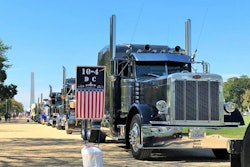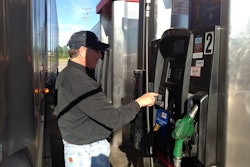Last Thursday saw the latest online webinar-type meeting of the National Coalition on Truck Parking and four working groups whose goal is bringing together “stakeholders from the public sector, transportation organizations, the freight industry, and other groups to advance safe truck parking” as a priority across the nation when it comes to infrastructure development. The groups, convened in the fall of 2017, are also geared to making better parking options a reality, ultimately.
All groups were focused on providing eventual end users of their work products with clear examples where parking is being prioritized around the nation with hopes of leading the way for other efforts in areas of highest need, which Federal Highway Administration Associate Administrator Martin Knopp noted have tended to be high-density interstate-highway corridors and major metropolitan areas.
Regardless of just where the needs are greatest, in the wake of Jason’s Law and ongoing organization around addressing them, “today’s shortage of truck parking capacity is a national safety concern,” Knopp says.
The working groups have consisted of between 48-60 people each, and have met four times since last year November. The groups each contained a “champion” who effectively worked to lead the group’s progress and were devoted to the topics of, respectively:
- Parking capacity, with Brian Hunter of the Florida Department of Transportation as champion.
- Technology and data, with Dan Murray with the American Transportation Research Institute
- Funding, financing and regulations | National Association of Truck Stop Operators Public Affairs VP Tiffany Wlazlowski Neuman
- State, regional and local government coordination | Scott Grenerth of Truck Specialized Parking Services

Though all four groups produced resources of some interest to Overdrive readers, former owner-operator Grenerth’s group sits at the place where the parking advocacy rubber meets the road. Grenerth noted Group 4’s resources were aimed “specifically to create usable tools that truckers and other advocates could use that relate to the task of planning at the local levels.”
Download all four groups’ work products to date via pdf this link.
Group 4 resources begin at p. 41 in the combined document containing all four groups’ efforts to date.
They include a run-down of ways regional Metropolitan Planning Organizations (MPOs) can include truck parking as part of their priority freight plans by working with experts on the ground, including truckers with expertise on parking facilities in the area. This section details the efforts of MPOs around Boston, Memphis, Atlanta, Arizona (and Maricopa County in particular), Dallas-Fort Worth and others that have shown the way for other MPOs around the country toward getting “crucial information that can be shared and speed up the process for other entities to make sure truck parking can actually happen,” Grenerth said.
Group 4 also put together something of a guide to “how to improve truck parking in your region,” he added, intended to “help advocates to get involved, particularly at the level of the MPO. This is an area where it’s very accessible, where people can really get involved.” That four-page document — p. 47-50 in the document — is a brochure intended for distribution locally and/or nationally by advocates to those with expertise who can be critical in the public-planning process.
Among other resources of interest include Group 1’s parking-capacity resource documents heading up the combined document. Brian Hunter of the Florida DOT noted the group principally focused on identification of how to “develop innovative low-cost ways to increase truck parking supply.”
The group focused on creative uses of rights of way, how to involve shippers and receivers as parking providers, and just what to consider in terms of basic amenities/needs with any low-cost facility.











